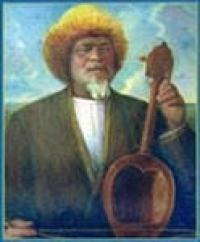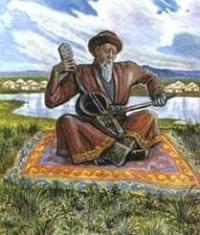You are here
Asan Kaigy.


Legendary figures in history of Kazakhstan.
"And this land is bad, there are no birds here except for the cuckoo, no smells except for the smell of grass...
Here the horses will grow old in five years, and the horsemen in twenty-five.
Karatau is good only as a summer camp, and for the winter you have to migrate to the banks of the Syr.
You can't live here all year round"
Asan Kaigy. "About Karatau".
Travel along Silk Road and Kazakhstan.
Asan Kaigy (late XIVth century - 60s of the XVth century), poet, philosopher, legendary figure. Nicknamed "Asan the sad" ("kaigy") because of his constant thoughts and reflections. He was an influential biy of Ulug-Muhammad, in Sarai and Kazan.
Asan Kaigy is the author of many edifying words and philosophical songs. Their fragments that have survived to this day reflect the historical events of that era, and Asan Kaigy's attitude to the events that were taking place. Asan Kaigy believed that "first we must strengthen the khan's power and strengthen the people's defense."
He reproached Zhanibek Khan: "Without thinking about the future of the Kazakh people, you rejoice at temporary successes." "The philosopher of the nomadic Nogai-Kazakh people" (according to Shokan Ualikhanov) sought to create a single state from related tribes, and was concerned about strengthening the Kazakh khanate."
Legends about Asan Kaigy are divided into three types: Asan's recognition; his nickname "sad"; Asan Kaigy's search for "Zheruyik" - "the Promised Land". The main content of Asan's works is determined by the idea of the unity of all Turkic clans that became part of the Kazakh Khanate.
Civil strife, the unsettled life of people, their constant need lead Asan to deep thoughts. He falls into sadness. Tolgau poems about grief, about the causes of misfortunes are born. Deep meaning is embedded in such colorful figurative poems. Legends and stories about Asan-kaigy tell that he, saddened by the difficult fate of his people, decided to find another world, the promised land - "Zhideli-baisyn", where the lands are fertile and fat, where people's days are carefree, happy, where there is no enmity and hatred, where "larks peacefully build nests on the backs of sheep."
Having traveled on his swift-footed camel Zhelmai across all the Kazakh steppes, mountains and valleys, Asan found no happy promised land anywhere and died in distant unknown lands, taking with him his great sorrow and unrealizable dream of people's well-being.
According to legend, he died a very old man on the land of Saryarka in the Ulytau Mountains. The people immortalized the name of Hasan Sabituly, calling him Asan the Sorrowful. Akyns began their songs about the history of the difficult path in the past with his name. Shokan Valikhanov called Asan the Sorrowful "the philosopher of the nomads". According to Kazakh versions, Asan-kaigy travels around China, Kashgar, Kokand, Khiva, Bukhara, visits the Russians and even includes the Caspian coast and the Ural River in his route.
When Asan reached the Chu River, he said: "The banks of this river are swampy and overgrown with reeds, where tigers (hide). Children will get sick here from (bad) water. A knife will always be taken out of its sheath here... and women here will always be strangers (captured by enemies)."
Seeing the Syr-Darya, Asan decided: "The upper reaches are rich, but there is little space for them. No more than two auls will be able to settle down." Finally, Asan visited Zhideli-Baysyn. Returning from there, he tells his relatives: "I have found a nomadic camp where you can ride a horse without skirmishes and fights, where the cattle will not be stolen by thieves and slaughtered by wolves, where we will not be left homeless.
Let's go to this land. To get there, for three years do not let a ram near the sheep, a camel near the she-camel and a bull near the cow (pregnant, pregnant and pregnant ewes could not endure the long migration). It is warm in that land. Without separation (without disuniting) we will live there."
In Zhideli - Baysyn you can "settle without worries, without fear that others will disturb you" - there will be a peaceful life, without wars and enemy invasions. Fairytale motives for searching for a happy land are intertwined with the narrative of historical events of the time of the separation of the Kazakh people from the Uzbek Khanate.
Khans Kerey and Zhanibek flee to Mogolistan, where Isen-Bugahan allocates them pastures in the Chu Valley. "You have moved into the cramped land of humiliation," "Having drunk kumys, you sit and sweat, while your people are ruined," he condemns Zhanibek for migrating to Chu.
Condemnation of Zhanibek's actions is evident from the lyrics of the songs: "Why didn't you find out, didn't recognize?", "Hey, khan, if I don't tell you you won't recognize me", "Farewell, Zhanibek, now you won't see me". ("The harrier is a slave of birds - feeding on mice, molts, The swan is a tore of birds - swims across a wide lake"), ("Hey Zhanibek, think, Are the last times coming?
Does the white pike floating in the water not rise to the top of the pine tree?"). Some songs and individual poems of Asan-kaigy are attributed to several zhyrau:
- "Askar, askar, askar tau, askardan biik tau bolmas", "Kyily, kyily zaman", "Grey dove" - are also attributed to Bukhar-zhyrau. The time of his life coincided with the process of formation of the Kazakh people and statehood. During the formation and development of the Kazakh nationality, zhyrau were advisers and warriors, inspiring fellow tribesmen.
Being mentors and sages, improvisers - zhyrau prophesied, instructed and inspired (the people) the army in campaigns. In the repertoire of zhyrau, two genre forms prevail: improvisation of didactic content, unwritten wisdom addressed to everyone, calculated for many generations of educated; improvisation for the occasion, having a direct reason and addressee.
In Asan-kaigy, the predominance of the first form is noticeable. It directly goes back to folklore didactic genres: proverbs, sayings, terme, nakyl-sozder, sheshendik sozder. Today we have only 23 publications and reprints of Asan-kaigy's texts. The poet's high authority is evidenced by the fact that he was nicknamed Asan-ata (Ata - literally grandfather, metaphorically respected, the eldest) for being in the court of Zhanibek Khan, and for showing himself to be the spokesman for the interests of the people.
He suggests that the Khan put aside personal interests and ambitions and put at the forefront the "duty of the Khan to the people", the sovereignty of the people, and their attitude towards their neighbors. Asan keenly felt the instability of the nomadic cattle-breeding life, its dependence on weather conditions, jute, frosts, when the cattle are deprived of food and die.
Hence his dreams "of the promised land", the tragedy of his worldview, which found expression in his nickname - the unfortunate, i.e. his acute experience of the suffering that life is full of, including human life. Hence the ideas of love and compassion associated with this, which gave Valikhanov the right to call him a "nomadic philosopher".
The "promised land" should become, Asan dreams, a place of happiness and equality of people. But regardless of the conditions of life, a person must be sincere and honest, fearing like fire a "bad word", for it is with them that "evil" is associated.
The purest and most priceless pearl
Lies in silence at the bottom of the sea.
The purest, immeasurable word
Lies in the depths of the soul.
That pearl that lies at the bottom of the sea,
Sometimes carried away by a stormy wave.
The purest, immeasurable word of thought
Carries out grief from the depths, from the bottom.
What in life is considered a misfortune?
The steppe, where it is too crowded to graze, is a misfortune.
A kind word that we
Did not have time to say, is a misfortune.
The elders who have lost their relatives,
And the care of their loved ones, is a misfortune.
An aunt who does not value her relatives,
For an adult girl, is a misfortune.
Valleys where cattle are not grazed
And the grass dies in vain, is a misfortune.
Steppe lakes, where geese and ducks do not live, are a misfortune.
Murids who did not teach to honor
Worthy people, is a misfortune.
A ruler who does not know how to lead,
His heritage - the people - to contentment,
No matter how good he is,
For those whom he rules, is a misfortune.
Translation by Vs. Rozhdestvensky.
Authority:
http://www.history.kz







